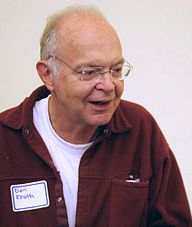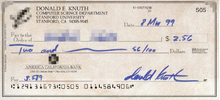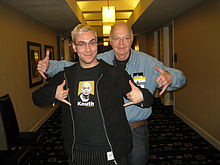
Donald Knuth
Background to the schools Wikipedia
This Wikipedia selection is available offline from SOS Children for distribution in the developing world. A quick link for child sponsorship is http://www.sponsor-a-child.org.uk/
| Donald Ervin Knuth | |
|---|---|
 Donald Knuth at a reception for the Open Content Alliance, October 25, 2005 |
|
| Born | January 10, 1938 Milwaukee, Wisconsin, U.S. |
| Residence | U.S. |
| Nationality | American |
| Fields | Mathematics Computer science |
| Institutions | Stanford University |
| Alma mater | Case Institute of Technology California Institute of Technology |
| Doctoral advisor | Marshall Hall, Jr. |
| Doctoral students | Leonidas J. Guibas Michael Fredman Scott Kim Vaughan Pratt Robert Sedgewick Jeffrey Vitter Andrei Broder |
| Known for | The Art of Computer Programming TeX, METAFONT Knuth–Morris–Pratt algorithm Knuth–Bendix completion algorithm MMIX |
| Notable awards | Turing Award (1974) John von Neumann Medal (1995) Harvey Prize (1995) Kyoto Prize (1996) |
| Website | |
| Donald E. Knuth | |
Donald Ervin Knuth (pron.: / k ə ˈ n uː θ / kə-NOOTH; born January 10, 1938) is a computer scientist and Professor Emeritus at Stanford University.
He is the author of the seminal multi-volume work The Art of Computer Programming. Knuth has been called the "father" of the analysis of algorithms. He contributed to the development of the rigorous analysis of the computational complexity of algorithms and systematized formal mathematical techniques for it. In the process he also popularized the asymptotic notation.
In addition to fundamental contributions in several branches of theoretical computer science, Knuth is the creator of the TeX computer typesetting system, the related METAFONT font definition language and rendering system, and the Computer Modern family of typefaces.
As a writer and scholar, Knuth created the WEB/ CWEB computer programming systems designed to encourage and facilitate literate programming, and designed the MIX/ MMIX instruction set architectures.
Early life
Knuth was born in Milwaukee, Wisconsin, where his father owned a small printing business and taught bookkeeping at Milwaukee Lutheran High School, where he enrolled, earning achievement awards. He applied his intelligence in unconventional ways, winning a contest when he was in eighth grade by finding over 4,500 words that could be formed from the letters in "Ziegler's Giant Bar"; the judges had only about 2,500 words on their master list. This won him a television set for his school and a candy bar for everyone in his class.
Education
Knuth had a difficult time choosing physics over music as his major at Case Institute of Technology (now part of Case Western Reserve University). He also joined Beta Nu Chapter of the Theta Chi fraternity. While studying physics at the Case Institute of Technology, Knuth was introduced to the IBM 650, one of the early mainframes. After reading the computer's manual, Knuth decided to rewrite the assembly and compiler code for the machine used in his school, because he believed he could do it better. In 1958, Knuth constructed a program based on the value of each player that could help his school basketball team win the league. This was so novel a proposition at the time that it got picked up and published by Newsweek and also covered by Walter Cronkite on the CBS Evening News. Knuth was one of the founding editors of the Engineering and Science Review, which won a national award as best technical magazine in 1959. He then switched from physics to mathematics, and in 1960 he received his bachelor of science degree, simultaneously receiving his master of science degree by a special award of the faculty who considered his work outstanding.
In 1963, he earned a Ph.D. in mathematics (advisor: Marshall Hall) from the California Institute of Technology, and began to work there as associate professor and began work on The Art of Computer Programming. He had initially accepted a commission to write a book on compilers which would later become the multi-volume The Art of Computer Programming. This work was originally planned to be a single book, and then planned as a six- and then seven-volume series. In 1968, just before he published the first volume, Knuth accepted a job working on problems for the National Security Agency ( NSA) through their FFRDC the Institute for Defense Analyses ( IDA) Communications Research Division situated at the time on the Princeton campus in the Von Neumann building as stated in his cumulae vitae. It seems likely Knuth left the position and joined the faculty of Stanford University because of his political beliefs and the volatile political climate on the campus at the time.
Writings
The Art of Computer Programming (TAOCP)
Computer science was then taking its first hesitant steps. “It was a totally new field," Knuth recalls, “with no real identity. And the standard of available publications was not that high. A lot of the papers coming out were quite simply wrong. (…) So one of my motivations was to put straight a story that had been very badly told.”
After producing the third volume of his series in 1976, he expressed such frustration with the nascent state of the then newly-developed electronic publishing tools (especially those that provided input to phototypesetters) that he took time out to work on typesetting and created the TeX and METAFONT tools.
As of 2012, the first three volumes and part one of volume four of his series have been published.
Other works
He is also the author of Surreal Numbers, a mathematical novelette on John Conway's set theory construction of an alternate system of numbers. Instead of simply explaining the subject, the book seeks to show the development of the mathematics. Knuth wanted the book to prepare students for doing original, creative research.
In 1995, Knuth wrote the foreword to the book A=B by Marko Petkovsek, Herbert Wilf and Doron Zeilberger.
Religious beliefs and work
In addition to his writings on computer science, Knuth, a Lutheran, is also the author of 3:16 Bible Texts Illuminated, in which he examines the Bible by a process of systematic sampling, namely an analysis of chapter 3, verse 16 of each book. Each verse is accompanied by a rendering in calligraphic art, contributed by a group of calligraphers under the leadership of Hermann Zapf.
Health concerns
In 2006, Knuth was diagnosed with prostate cancer. He underwent surgery in December that year and started "a little bit of radiation therapy...as a precaution but the prognosis looks pretty good", as he reported in his video autobiography.
Computer Musings
Knuth gives informal lectures a few times a year at Stanford University, which he called Computer Musings. He was also a visiting professor at the Oxford University Computing Laboratory in the United Kingdom and an Honorary Fellow of Magdalen College.
Humor
Knuth is known for his "professional humor".
- He used to pay a finder’s fee of $2.56 for any typographical errors or mistakes discovered in his books, because "256 pennies is one hexadecimal dollar", and $0.32 for "valuable suggestions". According to an article in the Massachusetts Institute of Technology's Technology Review, these Knuth reward checks are "among computerdom's most prized trophies". Knuth had to stop sending real checks in 2008 due to bank fraud, and instead now gives each error finder a "certificate of deposit" from a publicly listed balance in his fictitious "Bank of San Serriffe".
- He once warned a correspondent, "Beware of bugs in the above code; I have only proved it correct, not tried it."
- The preface of Concrete Mathematics includes the following anecdote: "When Knuth taught Concrete Mathematics at Stanford for the first time, he explained the somewhat strange title by saying that it was his attempt to teach a math course that was hard instead of soft. He announced that, contrary to the expectations of some of his colleagues, he was not going to teach the Theory of Aggregates, nor Stone's Embedding Theorem, nor even the Stone–Čech compactification theorem. (Several students from the civil engineering department got up and quietly left the room.)"
- Knuth published his first "scientific" article in a school magazine in 1957 under the title " Potrzebie System of Weights and Measures." In it, he defined the fundamental unit of length as the thickness of Mad #26, and named the fundamental unit of force "whatmeworry." Mad published the article in issue #33 (June 1957).
- Knuth's article about the computational complexity of songs, " The Complexity of Songs", was reprinted twice in computer science journals.
- To demonstrate the concept, Knuth intentionally referred "Circular definition" and "Definition, circular" to each other in the index of The Art of Computer Programming, Volume 1.
- At the TUG 2010 Conference, Knuth announced an XML-based successor to TeX, titled "iTeX" (pronounced [iː˨˩˦tɛks˧˥], with a bell ringing), which would support features such as arbitrarily scaled irrational units, 3D printing, animation, and stereophonic sound.
Awards
In 1971, Knuth was the recipient of the first ACM Grace Murray Hopper Award. He has received various other awards including the Turing Award, the National Medal of Science, the John von Neumann Medal, and the Kyoto Prize.
In recognition of Knuth's contributions to the field of computer science, in 1990 he was awarded the one-of-a-kind academic title of Professor of The Art of Computer Programming, which has since been revised to Professor Emeritus of The Art of Computer Programming.
In 1992, he became an associate of the French Academy of Sciences. Also that year, he retired from regular research and teaching at Stanford University in order to finish The Art of Computer Programming. In 2003 he was elected as a foreign member of the Royal Society.
Knuth was elected as a Fellow (first class of Fellows) of the Society for Industrial and Applied Mathematics in 2009 for his outstanding contributions to mathematics. He is a member of the Norwegian Academy of Science and Letters. In 2012 he became a fellow of the American Mathematical Society.
Honours bestowed on Knuth include:
- First ACM Grace Murray Hopper Award, 1971
- Turing Award, 1974
- National Medal of Science, 1979
- Franklin Medal, 1988
- John von Neumann Medal, 1995
- Harvey Prize from the Technion, 1995
- Kyoto Prize, 1996
- Fellow of the Computer History Museum, 1998
- Katayanagi Prize, 2010
- BBVA Foundation Frontiers of Knowledge Award, 2010
- Stanford University School of Engineering Hero Award, 2011
Works
A short list of his works:
- Donald E. Knuth, The Art of Computer Programming, Volumes 1–4, Addison-Wesley Professional
- Volume 1: Fundamental Algorithms (3rd edition), 1997. Addison-Wesley Professional, ISBN 0-201-89683-4
- Volume 2: Seminumerical Algorithms (3rd Edition), 1997. Addison-Wesley Professional, ISBN 0-201-89684-2
- Volume 3: Sorting and Searching (2nd Edition), 1998. Addison-Wesley Professional, ISBN 0-201-89685-0
- Volume 4A: Combinatorial Algorithms, Part 1, 2011. Addison-Wesley Professional, ISBN 0-201-03804-8
- Volume 4: Combinatorial Algorithms (remainder), in preparation
- Donald E. Knuth, The Art of Computer Programming, fascicles:
- Volume 1, Fascicle 1: MMIX—A RISC Computer for the New Millennium, 2005. ISBN 0-201-85392-2
- Volume 4, Fascicle 0: Introduction to Combinatorial Algorithms and Boolean Functions. 2008. ISBN 0-321-53496-4
- Volume 4, Fascicle 1: Bitwise Tricks & Techniques; Binary Decision Diagrams. 2009. ISBN 0-321-58050-8
- Volume 4, Fascicle 2: Generating All Tuples and Permutations, 2005. ISBN 0-201-85393-0
- Volume 4, Fascicle 3: Generating All Combinations and Partitions, 2005. ISBN 0-201-85394-9
- Volume 4, Fascicle 4: Generating All Trees—History of Combinatorial Generation, 2006. ISBN 0-321-33570-8
- Donald E. Knuth, Computers & Typesetting:
- Volume A, The TeXbook (Reading, Massachusetts: Addison-Wesley, 1984), x+483pp. ISBN 0-201-13447-0
- Volume B, TeX: The Program (Reading, Massachusetts: Addison-Wesley, 1986), xviii+600pp. ISBN 0-201-13437-3
- Volume C, The METAFONTbook (Reading, Massachusetts: Addison-Wesley, 1986), xii+361pp. ISBN 0-201-13445-4
- Volume D, METAFONT: The Program (Reading, Massachusetts: Addison-Wesley, 1986), xviii+566pp. ISBN 0-201-13438-1
- Volume E, Computer Modern Typefaces (Reading, Massachusetts: Addison-Wesley, 1986), xvi+588pp.
- Knuth, Donald E. Selected papers series
- Donald E. Knuth, Literate Programming (Stanford, California: Centre for the Study of Language and Information — CSLI Lecture Notes, no. 27), 1992. ISBN 0-937073-80-6
- Donald E. Knuth, Selected Papers on Computer Science (Stanford, California: Centre for the Study of Language and Information — CSLI Lecture Notes, no. 59), 1996. ISBN 1-881526-91-7
- Donald E. Knuth, Digital Typography (Stanford, California: Centre for the Study of Language and Information — CSLI Lecture Notes, no. 78), 1999. ISBN 1-57586-010-4
- Donald E. Knuth, Selected Papers on Analysis of Algorithms (Stanford, California: Centre for the Study of Language and Information — CSLI Lecture Notes, no. 102), 2000. ISBN 1-57586-212-3
- Donald E. Knuth, Selected Papers on Computer Languages (Stanford, California: Centre for the Study of Language and Information — CSLI Lecture Notes, no. 139), 2003. ISBN 1-57586-381-2 (cloth), ISBN 1-57586-382-0 (paperback)
- Donald E. Knuth, Selected Papers on Discrete Mathematics (Stanford, California: Centre for the Study of Language and Information — CSLI Lecture Notes, no. 106), 2003. ISBN 1-57586-249-2 (cloth), ISBN 1-57586-248-4 (paperback)
- Donald E. Knuth, Selected Papers on Design of Algorithms (Stanford, California: Centre for the Study of Language and Information — CSLI Lecture Notes, no. 191), 2010. ISBN 1-57586-583-1 (cloth), ISBN 1-57586-582-3 (paperback)
- Donald E. Knuth, Selected Papers on Fun and Games (Stanford, California: Centre for the Study of Language and Information — CSLI Lecture Notes, no. 192), 2011. ISBN 978-1-57586-585-0 (cloth), ISBN 978-1-57586-584-3 (paperback)
- Donald E. Knuth, Companion to the Papers of Donald Knuth (Stanford, California: Centre for the Study of Language and Information — CSLI Lecture Notes, no. 202), 2011. ISBN 978-1-57586-635-2 (cloth), ISBN 978-1-57586-634-5 (paperback)
- Graham, Ronald L.; Knuth, Donald E.; Patashnik, Oren (1994). Concrete mathematics: A foundation for computer science (Second ed.). Reading, MA: Addison-Wesley Publishing Company. pp. xiv+657. ISBN 0-201-55802-5. MR 1397498.
- Donald E. Knuth, Surreal Numbers: How Two Ex-Students Turned on to Pure Mathematics and Found Total Happiness. 1974, ISBN 0-201-03812-9. More information can be found at the book's official homepage
- Donald E. Knuth, The Stanford GraphBase: A Platform for Combinatorial Computing (New York, ACM Press) 1993. second paperback printing 2009. ISBN 0-321-60632-9
- Donald E. Knuth, 3:16 Bible Texts Illuminated (Madison, Wisconsin: A-R Editions), 1990. ISBN 0-89579-252-4
- Donald E. Knuth, Things a Computer Scientist Rarely Talks About (Centre for the Study of Language and Information — CSLI Lecture Notes no 136), 2001. ISBN 1-57586-326-X


